It has been one hell of a decade for Apple. As a fan of Apple, I've
watched its rise to dominance with some amazement.
Because I like Apple, I didn't realize how bad the first few years
of the decade were for it. To me, everything Apple has done was better
than before, so I didn't really look at the money, which tells a
different story.
10 Years of Financials
Apple has been such a juggernaut for so long that it was a shock to
look back and see quarters were it lost money. Apple lost $195 million
in Q1 2001, $45 million Q4 2002, and $8 million Q1 2003. In fact, Apple
lost money for the whole year of 2001.*
Compare that with today, where Apple reported $4.3 billion in profit
for Q4 2010. That is a pretty good turn around.
I went looking through all of Apple's quarterly announcements, and a
few other interesting things showed up.
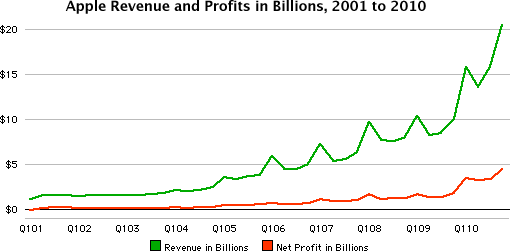
The first is that revenue has tracked well with the sale of Macs.
From 2001 to 2004, both the sale of Macs and revenue were stagnant. By
the end of 2005, things were picking up, and with the switch to Intel
CPUs - starting in 2006 - business really started to grow.
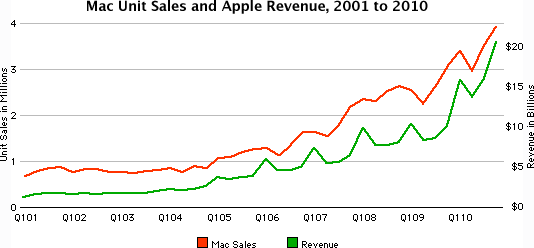
iPod Impact
The spikes in revenue that happen every first fiscal quarter do not
match the sale of Macs. These spikes are due to holiday sales of
iPods.
The iPod has incredible spikes in sales during the holidays,
doubling the number sold in prior quarters. I honestly doubted the
numbers I was reading, because they were so much higher than the
previous quarter. I thought I was looking at the wrong year, something
more recent, but Apple has repeated these iPod sales bursts every year.
And the following year, the average grew until 2006, when either the
iPod market was saturated or iPhones started to impact sales.
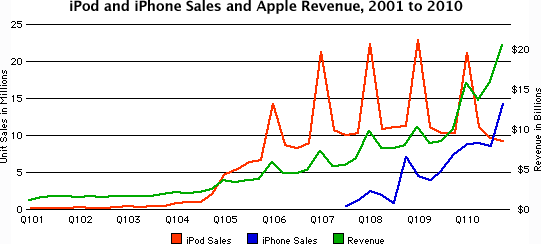
Because it takes a lot of iPods to equal the value of a Mac sold,
the spikes in revenue are much smaller than the sales volume of iPods.
Still you can't ignore the effect on Apple's bottom line.
iPhone Impact
If you to combine the iPod and iPhone sales, the growth trend looks
uninterrupted. We clearly see that the iPhone has taken over some iPod
sales. The results from this past holiday quarter are not in yet, but
if I had to guess, based on the trend, Apple has probably sold 35-40
million units combined. (The actual number will be released sometime in
January.)
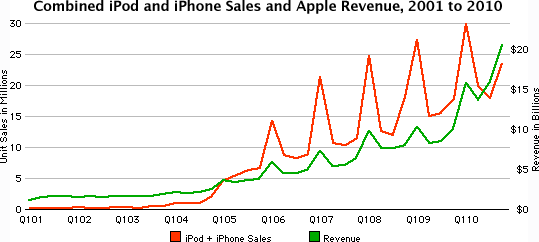
A new trend, which is just starting to show, is that revenue is now
growing faster than Mac units sales. That is because iPhones are much
better revenue generators than iPods. As iPod users migrate to iPhones,
they are replacing a cheaper product with a more expensive one. Any
business observer has to be impressed that Apple can pull off a
conversion like that.
Then Came the iPad
Along with iPhone revenue, Apple added the iPad in 2009. This isn't
a phone, MP3 device, or a computer (at least not a traditional Mac). In
this new category it is adding to the number of products sold without
impacting the number of Macs or iPhones sold. It has been a win-win for
Apple. Next quarter's results will either continue the trend or the
volume of iPads will begin to have an impact on Mac unit sales. I can't
wait to find out.
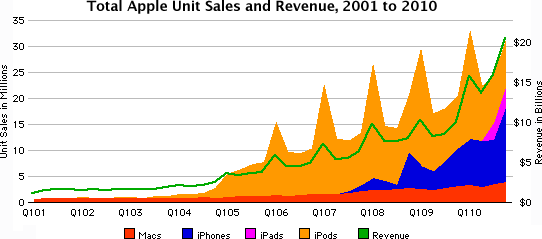
If iPads are going to more switchers - people who use Windows PCs -
then iPads will simply continue to add to Apple's bottom line. If
mostly Mac users are buying iPads, eventually people who were going to
buy a MacBook will be choosing a cheaper iPad instead.
My bet is on the first option, based on the number of PC users I
know who have bought an iPad. I haven't found the iPad to replace my
need for a notebook, but it is great for casual computer use.
This new year we see major opportunity for Apple to sell a ton of
iPhones through Verizon and hopefully other carriers. The explosion of
iPads, especially an updated iPad, is also waiting to happen.
We can expect to see a continued decline in the importance of the
Mac to Apple's overall financial picture, but it is a long way until
these mobile products completely sideline the Mac's impact on revenue.








